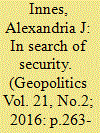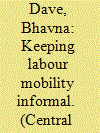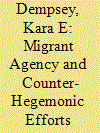| Srl | Item |
| 1 |
ID:
146084


|
|
|
|
|
| Summary/Abstract |
This article explores a performative conceptualisation of security, foregrounding the experiences of an asylum seeker from Ghana in Greece, named Sonny. This article follows Sonny’s search for security, analysing both his journey to Greece and to refugee status (something that he was still waiting for) and the narrative through which he told his story to me. I argue that Sonny’s search for security illustrates how security might be produced by security-seeking actions performed by an agent other than the state. It accesses security on an ontological level that is performative in that security is constituted through actions, and is known through attending to experience. This security allows for incorporation of intersectional identities, subaltern identities and diverse experiences. The argument is situated in the context of migration and the migrant journey as offering unique scope for analysis in international relations that is capable of moving beyond the state. It briefly surveys the human security and feminist security literatures to elaborate on the value of conceptualising security as a practice and as an experience of everyday life, rather than an object to be obtained. To offer purchase on the performative conceptualization of security narrative analysis foregrounds Sonny’s agency to seek security, juxtaposing his feeling of security and process of security with the material security that was provided to him as an asylum seeker in Greece.
|
|
|
|
|
|
|
|
|
|
|
|
|
|
|
|
| 2 |
ID:
134372


|
|
|
|
|
| Summary/Abstract |
Kazakhstan's legal–regulatory framework provides for a small number of quotas for highly skilled foreign workers but has no provisions for legal employment of semi-skilled or low-skilled migrants from the Central Asian states, who enter under the Commonwealth of Independent States (CIS) visa-free regime and work informally in construction, household and service sectors. The lack of acknowledgement of the scale of informal labour migration has denoted an act of strategic neglect on the part of the state, allowing it to render migrant labour illegal, disposable, and keep migrants legally and statistically invisible. Unable to obtain a legal status, migrants nominally comply with the existing legal framework as they also circumvent and subvert it. The article details the entrenched informal regime of labour migration and explains why recent efforts to ‘legalize’ labour through the introduction of a labour patent (licence), as is the case in Russia, are unlikely to bring in significant reforms.
|
|
|
|
|
|
|
|
|
|
|
|
|
|
|
|
| 3 |
ID:
184326


|
|
|
|
|
| Summary/Abstract |
Migrants who reach EU asylum camps face various forms of spatialised violence that are bolstered by or produced within these geopolitical protracted spaces of waiting. Segregated from society, migrants experience processes of displacement, alienation and vulnerability as their legal status restricts their mobility and postpones employment or education opportunities. They are simultaneously suspended in a state of continuous disruption as they move through a series of camps while waiting for a decision on their applications. In remonstration, some migrants develop advocacy networks within and across camps in an attempt to challenge the hierarchical control of the everyday spaces and politics that migrants encounter in camps. Drawing on original fieldwork, this paper interrogates the intersection of the spatial production of geopolitical violence in camps and migrant agency within these distinctive political spaces. I argue that a state-centred examination of spaces of violence and migrant agency fails to attend to embodied and emotional landscapes when problematising the geographies of camps and those waiting in interim zones of confinement. In contrast, this examination of the embodied migrant experiences and advocacy networks brings the geopolitics of human and affective matter to the forefront. In this way, the article highlights migrant agency in response to their lived experience and the embodied geopolitical violence of control, categorisation and exclusion that is produced in the various spatialities of asylum seeking.
|
|
|
|
|
|
|
|
|
|
|
|
|
|
|
|